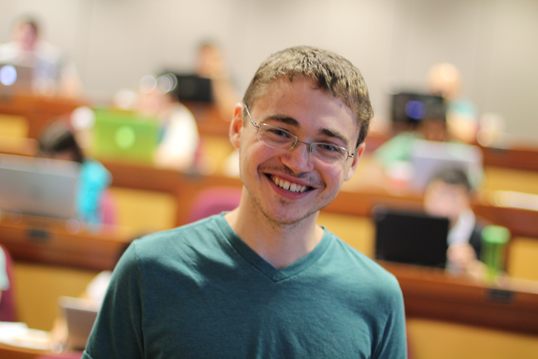
Alfred Simkin, PhD, GSBS ’14, taught a series of courses on the Python programming language, the first of several planned student-led workshops organized by The Bootstrappers.
Alfred Simkin, GSBS ’14, spent years teaching himself the Python programming language so he could efficiently analyze the large quantity of data essential to his research on the evolution of non-coding RNA. He read instructional books and websites, consulted programming friends and sought out the handful of Python experts on campus when he got stuck, which happened often.
“It was a frustratingly slow process,” he said.
But once he finally mastered the program, he could analyze his data without the need for bioinformatics specialists, who are skilled at crunching the numbers but can’t always provide insight into the biological questions the output creates. Using Python, Simkin was able to analyze large quantities of data himself, adjust and test his hypotheses, and make tremendous progress on his research. He was eager to share his knowledge with his friends and fellow students, and found a receptive audience of fellow scientists-in-training who recognized the benefit of what he called “taking control of their own data.”
It is just this type of knowledge sharing that the Graduate Student Council had in mind when members created The Bootstrappers, a student-led group facilitating informal learning communities among Graduate School of Biomedical Sciences students and postdocs. Founding members of The Bootstrappers were awarded a special Outstanding Mentor Award at the GSBS Celebration of Student Achievement in May, just a year after the program was launched.
“Students come to graduate school to become an expert in an area that interests them, and if they are successful, they can go off into areas that no one else has figured out how to study yet, not even their advisor,” said Simkin, a GSC member and founding Bootstrapper who recently defended his PhD dissertation and will begin postdoctoral work at Cornell University in September. “The idea behind The Bootstrappers is that no matter how specialized or esoteric the topic, there are probably at least five people on campus who are experts or have an interest in it. Why not get them together and teach each other what has worked for them and what has not?”
“What these students are doing is identifying experts among themselves and creating workshops in areas of high demand,” said Mary Ellen Lane, PhD, associate professor of neurobiology, associate dean of GSBS curriculum and academic affairs, and senior director of administration. “In a sense, they are testing out the idea of a nano course—a short, focused course on practical knowledge that you can take at any time. Depending on the success of the courses, we may consider integrating them into the more formalized GSBS curriculum. We see no need to get in their way.”
After learning from a test course he tried out on friends, Simkin created a 12-hour workshop, conducted over four days, introducing the basics of Python. Twice as many people signed up for his first 20-person workshop than he could accommodate. The second workshop was also over enrolled, even though he increased the number of available slots. In his final workshop at the end of July, he involved teaching assistants from the UMMS bioinformatics program and offered the course to an unlimited number of participants—and 91 signed up, highlighting the popularity of the subject matter.
“We hope that The Bootstrappers will enable students to learn new, beneficial skills they can apply to their research,” said GSBS student Jill Moore, who has taken over leadership of The Bootstrappers with fellow student Adam Wespiser. “Our workshops and courses are designed to give students a structured learning environment without the pressure and responsibility of for-credit classes. We hope to eventually expand our workshops to include statistics and wet-lab techniques and are actively recruiting students with expertise in these areas.”
Moore is planning a workshop in the fall on UNIX, which will focus on how students can use simple computer commands to make their research life easier, she said. “Since I work in a computational lab, I use programming skills on a daily basis and know how useful they can be.”
Besides offering ways to share knowledge, Bootstrapper workshops also provide essential teaching opportunities to students like Simkin who want to pursue that career path, especially because the formal GSBS curriculum has no teaching requirement.
“As a group, we also want to create a platform for students to develop curriculum and gain teaching experience,” said Moore. “We give students the chance to develop curriculum on a topic that they are interested in and help them create a fun and informative course.”
Essential to the success of Bootstrapper workshops is the cooperation of the faculty researchers who mentor students. Both those who teach and those who take the courses must be released from lab duties, which may not always be convenient.
“The obvious benefit to the researchers is that their trainees are bringing these skills back to the lab. Students are also developing skills that will make them competitive in the academic job market,” said Dr. Lane. “In fact, these workshops raise the skill level of the entire trainee population.”
Moore said the group is exploring informal ways to transfer knowledge as well. “In the fall we hope to launch our Data Happy Hour, where students and postdocs can come and ask questions about analysis and wet-lab techniques, or just talk about science in general,” she said.